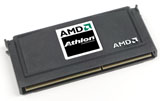

- What a pleasant
surprise to restart this weekly column and realized that all the good things I was expecting for AMD happened! As we all know AMD shipped their Athlon
( aka K7 ) on time putting away the x86 performance crown from Intel. The end of last year was a real
revolution for the x86 CPU industry. It was indeed the first time Intel had to catch-up with another x86
CPU manufacturer performances and it went pretty bad. Off course it
wasn't totally catastrophic for them due to the inertia of this market.
But repeated failures to deliver indicated that Intel was under stress
such as the bug in the i820 chipset( aka
Camino ), the
bugs in the early PIII-600Mhz, the quasi unavailability of the
Coppermine PIII-733Mhz, the failure to impose Rambus DRAMs. Most of these failures
were due to Intel compressing
schedules to roll out products way earlier than expected. For the first
time in a while Intel faced a problem AMD
suffered : the inability to produce enough high-end chips to meet
its customer demand. Many Intel believers such as Gateway ran into
troubles and were forced to bring back AMD
CPUs to their PC line.
- Unfortunately for
Intel this is not their only problem… Another player is coming to the
game : VIA technologies. They have
designed a chipset ( VIA KX133 )
that not only takes advantage of technologies Intel haven’t deployed yet
( SDRAM 133 support ), but also is optimized for a non-Intel CPU ( AMD
Athlon ). This chip is predicted to sell very well due to the
indisputable technical superiority one would have building an Athlon
platform around it. Intel will
now have to catch-up on VIA as well.
Especially to design a chipset that support PC133 SDRAMs since
they turn out to be a much cheaper alternative than Rambus DRAMs for about the same
performance gain…
- At this point Intel have lost its technical supremacy
on two key domains : CPUs and chipset. It is not a surprise though since
Intel bet on several things like Itanium (
aka Merced ) or a better acceptance of Rambus DRAMs. This has reduced the
efforts Intel put on the development
of its x86 line and killed any chipset development using other memory
types than Rambus. How is the giant
going to survive year 2000? Well time will tell us. But we should keep
in mind that giants are giant mainly because of their ability to come
back whenever they start losing ground. In any case some of the
elements key to Intel future success
will be the acceptance of Itanium
CPUs and Rambus DRAMs
by the market this year.
| Related Links : |
|
After missteps,
Intel plays catch-up on chip sets ( eeTimes ).
Gateway
moves back to AMD with new PC ( CNET news.com) |
Question, comment or objection : email me.
